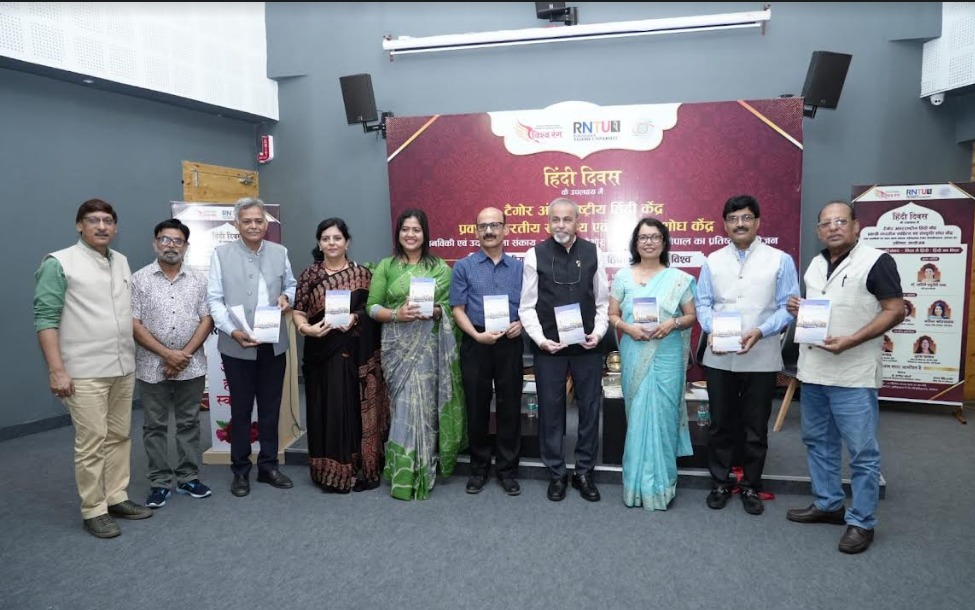CNN Central News & Network–ITDC India Epress/ITDC News Bhopal: As part of Vishwarang, the ‘Hindi Fortnight’ was grandly inaugurated by the Tagore International Hindi Center, the Center for Diaspora Indian Literature and Culture Research, and the Faculty of Humanities and Liberal Arts at Rabindranath Tagore University, Bhopal, in celebration of Hindi Day.
The Hindi Fortnight was initiated at the Katha Auditorium, Rabindranath Tagore University, Bhopal, with an international symposium on the topic ‘Hindi in the World: Hindi’s Global Presence.’ The event began with a ceremonial lighting of the lamp, followed by a welcome address by Sangeeta Johri, Pro-Vice Chancellor of Rabindranath Tagore University. All the guests were honored with shawls and mementos.
On this occasion, the Tagore International Hindi Center presented the ‘Hindi Learning Curriculum,’ designed for promoting Hindi education globally. Additionally, the book Selected Works of Canada, part of the Diaspora Literature Series published under Vishwarang, was launched. Another book on the creative works of Canadian diaspora author Dharmapal Mahendra Jain, edited by Deepak Pandey and Nutan Pandey, was also released by the guests.
In his presidential address, senior author Dharmapal Mahendra Jain (Canada) emphasized the rapid global expansion of Hindi. He shared his experience of establishing an organization in Toronto (Canada) to promote Hindi, which now has 400 members actively contributing. He also mentioned the creation of four manuals to teach Hindi to prisoners, underscoring the importance of dedicated efforts toward the development of Hindi.
Chief guest Aditi Chaturvedi Vats, Pro-Chancellor of Rabindranath Tagore University, expressed that the foundation of the AISECT group is rooted in Hindi. The journey began with the publication of the Hindi book Introduction to Computers 40 years ago, under the leadership of AISECT group president and Vishwarang visionary Santosh Choubey. Today, Vishwarang is playing a significant role in establishing Hindi’s presence on a global scale.
She also mentioned that Hindi Fortnight was launched at all six AISECT University campuses: Rabindranath Tagore University (Bhopal, Madhya Pradesh), C.V. Raman University (Khandwa, Madhya Pradesh), Bilaspur (Chhattisgarh), Vaishali (Bihar), and AISECT University (Hazaribagh, Jharkhand). Until September 30, various creative activities will be held to promote Hindi among students and faculty members.
Special guest Anurag Sharma, editor of Setu (USA), highlighted the love for Hindi across different countries and mentioned that this sentiment led to the launch of Setu magazine, which has gained popularity in many countries. He emphasized the importance of uniting all Indian languages and dialects for the development of Hindi, as this collective effort would greatly benefit the language.
Atilla Kotalawal, President of the Hindi Institute (Sri Lanka), spoke about the vast potential for Hindi in Sri Lanka, stating that the future of Hindi there is bright. As a native Sinhala speaker, she shared her journey of studying Hindi as a foreign language and teaching it for the past 24 years. Hindi is taught as an elective subject in eight universities and 80 schools in Sri Lanka, and there is a strong passion for Hindi films and songs. She also teaches Hindi to children as young as four and adults as old as 80. She credited Hindi for shaping her global identity and expressed her deep love for the language.
Deepak Pandey, Assistant Director at the Central Hindi Directorate, Government of India, New Delhi, emphasized the Directorate’s key role in promoting Hindi and called on both government institutions and individuals to actively preserve and promote their languages and dialects. Dr. Nutan Pandey, also an Assistant Director at the Central Hindi Directorate, highlighted the role of diaspora Indians in promoting Hindi across various countries. Sharing their contributions will further expand Hindi’s global reach, and this symposium under Vishwarang is a step in that direction.
The event was successfully anchored by Jawahar Karnawat, Director of the Tagore International Hindi Center, and concluded with a vote of thanks by Vinay Upadhyay, Director of the Tagore Center for World Arts and Culture. A large number of faculty members and students participated creatively in the symposium.
Notably, the guests also toured the Diaspora Indian Literature and Culture Research Center, the Tagore World Arts and Culture Center, the Tagore Theatre School, the Center for Sanskrit, Ancient Languages, and Indian Knowledge Tradition, the Multilingual Translation Center, the Vanmali Srijan Peeth, and the Tagore National Theatre School.







